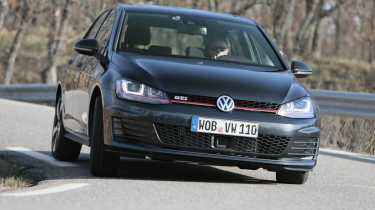2013 VW Golf GTI Performance Pack video review
The mk7 VW Golf GTI has more power, loads of new tech and a Performance Pack option. We drive it on video
What is it? The mk7 VW Golf GTI. Now in its seventh iteration and 37th year, we’d wager no other car of its genre has ever benefitted from more engineering man-hours, development miles or intellectual effort. It’s priced from £25,845, but the more focused GTI Performance tested here starts at £26,825. Technical highlights? The mk7 GTI offers a variety of new driver-focused technologies – an electrically controlled mechanical differential, a revised 2-litre turbo engine with variable valve timing, and a chassis with configurable dynamics. Talking to the engineers, a philosophy of improved body control, more immediate responses and increased performance emerges. This Performance Pack version of the car costs £980 more than the standard GTI and gives you ten extra horses (taking the total to 227bhp), that trick diff and larger front brakes – up from 312/25mm (diameter/thickness) to 340/30. Both the Performance Pack and the standard GTI models have vented discs on the front, of course, but the PP gets vented discs on the rear too. We also have Adaptive Chassis Control (another £795), while Driver Profile Selection – which allows you to configure the ACC settings, amongst other things – is standard. What’s it like to drive? First impressions are very good. There’s a real linearity to the controls, great weighting and resistance in the pedals, quick steering, and the gearshift throw feels shorter and faster than the mk6 VW Golf GTI. Progressive Steering, standard on the GTI, combines an electric motor with a rack-and-pinion set-up. However, the tooth spacing on the rack is variable rather than constant – the aim being a faster response to extreme inputs and fewer turns lock-to-lock, but without the high-speed instability associated with a conventional ‘quick’ rack. The result is very impressive. Time to up the pace. ACC in Sport means stiffer damping, heavier steering, better throttle response and looser ESP. The chassis tenses noticeably and through a fast chicane, the GTI remains flat and agile. Indeed the speed carried through quicker corners is eye-opening – even acting the hooligan and suddenly lifting off does nothing but tighten the line. Again, this is deeply impressive – grip across the rear axle is secure and the GTI’s stability superb. The mk7 GTI certainly feels much happier over mid-corner bumps than the mk6 GTI. That’s not to say the mk7 is better – indeed, the slightly busier rear axle of the mk6 telegraphs useful information to the driver – but it adds to the mk7’s more stable, controlled character. The new car can make quite extraordinary progress on the road, the innate sense of solidity encouraging harder and more aggressive driving. The brakes never fade on track or road, the chassis never shudders or shivers over rough tarmac, and the chassis’ overall poise is nothing other than settled and contained. How does it compare? Far cheaper than the GTI but offering similar practicality (and more in its unique estate version) is the 247bhp, £21,995 Ford Focus ST, while greater driving thrills come from the 276bhp, £26,995 Vauxhall Astra VXR and the 261bhp, £25,245 Renaultsport Megane 265, our current hot hatch of choice. The Golf also appeals to premium buyers, who might be considering the 296bhp, £30,500 Audi S3 or 316bhp, £30,555 BMW M135i, which is a fine rear-drive choice. Anything else I need to know? The main issue is the GTI’s ability to excite. The most engaging front-wheel-drive hot hatches take a while to key into. After an hour on track and a couple of hours on the road it felt like the GTI had yielded all of its character. A fuller analysis is in evo issue 183, on sale Wednesday April 24.
Specifications
| Engine | In-line 4-cyl, 1984cc, turbocharged |
| Max power | 227bhp @ 4700rpm |
| Max torque | 258lb ft @ 1500-4600rpm |
| 0-60 | 6.4sec (claimed 0-62) |
| Top speed | 155mph (claimed) |
| On sale | Now |



